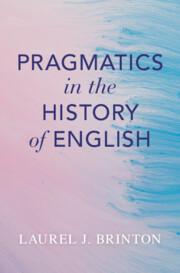Refine search
Actions for selected content:
3 results
Introduction to Volume II
-
-
- Book:
- The New Cambridge History of the English Language
- Published online:
- 18 October 2025
- Print publication:
- 16 October 2025, pp 14-24
-
- Chapter
- Export citation
23 - ‘Bad Data’: The Case for Early Audio Records
- from Part III - Genre and Medium in the Record
-
-
- Book:
- The New Cambridge History of the English Language
- Published online:
- 18 October 2025
- Print publication:
- 16 October 2025, pp 559-585
-
- Chapter
- Export citation

Pragmatics in the History of English
-
- Published online:
- 28 September 2023
- Print publication:
- 12 October 2023
